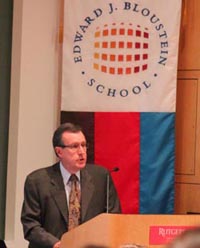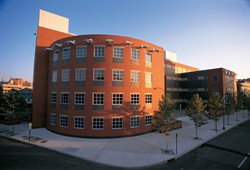Celebrating 20 years, school has carved out role as national resource in public planning, service
It may be one of the youngest schools at Rutgers, but the Edward J. Bloustein School of Planning and Public Policy has a robust reputation under its institutional belt.
The Times article calls it “a knowledge factory for the state.” Planetizen, a planning-related news website, ranks Bloustein’s graduate urban planning department third in the nation, out of 105 contenders. Hundreds of its graduates dot the public service landscape from the municipal level on up to the federal government.
Now a yearlong series of forums, lectures, and colloquia is under way, designed both to mark the school’s

A highlight of the celebration will take place next month, with a two day symposium on "Planning Healthy, Sustainable Communities" on April 26-27, and a reception and dinner at the Hilton East Brunswick Hotel on April 26.
James W. Hughes, longtime Bloustein dean, has watched his school put its distinctive stamp on such diverse fields as housing, transportation, workforce development, public health, economic development, energy, and social justice.
“Our graduates are all over the place,” says Hughes. “We provide a lot of the key people who keep the state running.”
Count among them Tom Dallessio of Hopewell, who as a senior policy advisor for former New Jersey governor Christine Todd Whitman wrote the act that preserved 1 million acres of Garden State open space. And Anthony Marchetta, executive director of the New Jersey Housing and Mortgage Agency, who spent a decade overseeing the Middlesex Department of Housing and Community Development.
Other alumni hold leadership positions with Amtrak, the U.S. Department of Housing and Urban Development and the National Mediation Services, as well as New Jersey’s Departments of Environmental Protection, Community Affairs and Transportation, among others.
In its downtown New Brunswick headquarters housed in Civic Square, on the site of the former Arnold Constable department store, Bloustein brings together under one roof formerly disparate units focusing on undergraduate and graduate planning, public policy, and public health. Its undergraduate courses attract students from the entire university.

Looking back over the past two decades, Hughes prefers not to highlight any singular event or program, but rather to laud the research centers and institutes within the school that focus on local, city, state and regional planning.
Their reach goes both deep and wide.
Bloustein’s Alan M. Voorhees Transportation Center, for example, has teamed with the state’s Department of Transportation to make trains and busses more appealing to people with disabilities, seniors, and non-English speakers. The John J. Heldrich Center for Workforce Development issues a consumer “report card” that evaluates the state’s worker training programs.
The Center for Urban Policy Research serves as a de facto research arm for the nation, Hughes says, completing more than $40 million worth of sponsored research for federal agencies, major private foundations, and state and local agencies. Among its projects has been a profile of U.S. military bases in New Jersey.
There’s hardly a segment of public life in the Garden State the Bloustein School hasn’t touched, Tom Dallessio says.
“As someone born and bred in New Jersey, I am always hearing that Bloustein has a tremendous reputation around the country,” notes the former executive director of Leadership New Jersey, now adjunct professor at the New Jersey Institute of Technology.
The education he received gave him the tools to be an effective planner, he says.
“Planners are by their very nature multifaceted folks, trained in a liberal arts background to use empirical research to make decisions,” says Dallessio, a borough councilman in Hopewell for eight years and former president of the Bloustein School Alumni Association. “What makes Bloustein so critical is that it not only provides you with a world-class education, but it also gives you real-world, day-to-day experience about how New Jersey works.”
Tony Marchetta brings that insight to bear at the New Jersey Housing and Mortgage Finance Agency, an agency with assets of $4.5 billion that finances affordable housing developments throughout the state.
“The concept of urban planning is something that grew into its own in the last three or four decades, and Bloustein has been at the cutting edge,” Marchetta says. “The school’s focus has been on how to use resources most effectively, and New Jersey has benefitted dramatically from its contributions.”
As a go-to guy for state and national media, Hughes certainly qualifies as one of those resources. Editors and reporters turn to him to interpret census data, provide economic forecasts, predict housing trends, and advise on workforce policy. He does it all with a patented dry wit and understated humor.
Most recently, the Rutgers University Alumni Association gave Hughes its Richard P. McCormick Award, which recognizes a dean or faculty member who has performed outstanding service for the RUAA.